- Home
- Tony Roberts
The Anzac Page 2
The Anzac Read online
Page 2
There were a few rooms along the same wall but they appeared to be wards just like the one he’d come out of. Someone flicked a switch and a naked light bulb in the ceiling ahead of him burst into life. Casca winced and tried the first door on the left and it opened inwards.
He quickly shut the door. From the sound of dripping water it appeared he was in some sort of wash room. He listened carefully by the door and heard footsteps approach, then pass. Casca puffed out his cheeks and searched for and found a Bakelite switch. Flicking the switch, he suddenly could see. A mirror stood above a white Belfast sink across the room and he made for this.
“Shit,” he commented when he saw the ravaged features of his face. “They’ll think I’ve got leprosy.” It was a mass of red, black and white. Some of the skin was peeling off, revealing soft new skin underneath. He wouldn’t recognize himself if he were handed a photograph. His upper chest looked the same. He needed clothing.
He had an idea. If he were a leper, he may as well pass as an Egyptian. He turned off the light and left the wash room. Along the corridor, still lit, he found a changing room. Doctors’ long white coats hung from pegs, but he wasn’t interested in them. He rummaged through some discarded clothing, obviously ready for the laundry, and found a loose djellaba, perfect.
He discarded his hospital gown and slipped the djellaba over his head. The coarse cotton material caught on his tender skin and he hissed in pain. It would be a trial to move but he had to get out of here fast. His medical condition was too unique to go unnoticed. Already that man Clark and the doctor were suspicious.
If the djellaba was unclean, he didn’t worry; he was immune to any infection. Besides, it would help his disguise. All he needed now was some sort of head cover. A turban provided this and he wrapped it around his head, gently. He covered his face except his eyes. The eyes were a giveaway that he wasn’t an Arab, as they were light blue, but he couldn’t do anything about that.
One of the windows was open, to allow for any breeze to cool down the interior, he guessed. It must be facing the direction of the sea, for nobody would bother with the south side. That way was the desert and the sunnier side during the day. One painful climb later he was outside in another courtyard and sneaking through parked military vehicles. Ambulances, automobiles, and a few carts. Soldiers patrolled the perimeter by the roadside, bayonets affixed to their Lee Enfield rifles.
The other way was a tip. Obviously the hospital had to dispose of their refuse and there it was. Hemmed in by whitewashed stone walls, a pile of discarded packaging, broken furniture, soiled clothing and things Casca didn’t want to think about. Rats rummaged around it, and Casca pulled a face. He wasn’t going to hide in that.
The brightest lights were coming from the direction of the way out where the guards were. That way was towards the docks, lit up all night for the war machine of Britain. It was the opposite direction Casca was going to go; deep into the back streets of the city. He knew it now to be Alexandria, and his memories of being here before clicked into gear. The Souk – the bazaar – was close by, and the warren of small streets and the general lawlessness in that area would be ideal for someone like him. The British generally wouldn’t wish to go there.
But how to get there?
The only way out available was through the guarded entrance. The lights of the docks lit up the wicked spines of barbed wire atop the brick walls to either side, and the huge stone walls of the refuse tip were too high and sheer to be climbed. Casca eyed the vehicles again.
A relatively new invention, his few experiences with motor vehicles were within the last year. They weren’t all that happy. He had little idea how they worked except there was a starter switch, a brake and a pedal that made it go. After that you steered with the wheel and hoped to God nothing got in your way. If you were bigger and heavier, well that fine. If you weren’t, then pray for good luck and better brakes.
He looked in the open cab of the nearest ambulance. The smell of oil and grease was strong, but he had little idea how to start it. Maybe they used a starting handle. The distance to the gate and the guards was thirty yards and they’d be on him in no time. Casca decided there was nothing to it but to wait and hide. The back of the vehicle was open and he got in and burrowed slowly under a blanket resting on one of the fixed bunks.
He lay there trying to ignore the constant pain. He knew it would be a couple of weeks yet until his face was acceptable for society. Until then he’d best hide or risk being stoned by people fearful of catching leprosy.
An hour or two had gone by when suddenly voices came to him. “I want everywhere searched for him; he can’t be far. Get all the vehicles out and checked.”
Casca cursed. His absence had been discovered and the Doc was moving heaven and earth to find him. He felt the ambulance shake as someone got into the cab and shouted something. Next moment the engine caught and there was a metallic screech and the vehicle lurched forward a few feet. It stopped as suddenly as it had started and the door of the cab slammed shut. Footsteps came alongside on the other side of the metal skin and then towards the rear doors. Casca threw the blanket aside and lightly jumped to his feet.
The door swung open and Casca threw the blanket over the head of the startled man, grabbed him and threw him into the ambulance. He struck what he guessed was the head once, just to quieten him down, and tugged the cloth aside. The semi-conscious figure was dressed in khaki and clearly belonged to the army. He was a private, judging by the absence of any rank insignia. Casca grabbed the flat-topped peaked cap, shrugged on the jacket over his djellaba, hissing once more in pain, and boldly stepped out. In the darkness it was easy to be mistaken.
Other figures were milling about; some were making for the other vehicles to check them, so Casca climbed into the cab, pulled a few levers until the ambulance began moving, then pressed the pedal. The vehicle moved forward, the engine revving higher and higher, and he steered towards the gate.
“Hey, where you going?” someone yelled.
The guards turned. The damned thing was going too slow! Casca recalled something called a gear. It allowed greater speed at higher revs. He looked around hurriedly and saw a second pedal and what must be the gear lever. He hauled on it and the noise of something being tortured echoed throughout the courtyard.
“Stop him!” came a voice and the two guards unhitched their rifles.
“Shit,” Casca muttered and gunned the engine. The ambulance shot forward. He saw the muzzles of the rifles line up on him and he ducked. The crack of the shots and the sound of the windshield disintegrating came as one. He held onto the steering wheel and plowed on towards the two guards. One dived aside in time, but a soggy thud on the passenger side meant the other man had been too slow. There came a high-pitched scream and someone shouting at him about his questionable parentage.
Casca looked through the ruined glass ahead. A wall was closing rapidly so he hauled hard and the ambulance heeled over sharply. Casca felt the right hand wheels leave the ground and he realized too late he had taken the turn too sharply. Another shot crashed into the vehicle and the ambulance toppled over, sending Casca hard against the wheel, striking the edge of the windshield frame and then over the top, bouncing against the hood and then the madly spinning tire. The ambulance screamed across the ground, sliding, and struck something solid and came to a halt. Casca was sent through the air to strike the ground hard, and he rolled for a few feet, then lay there, half-dazed, staring up at the sky. He’d left some skin on the ground in his journey from the ambulance.
“There he is!” one of the soldiers shouted, aiming his rifle again.
“No!” he heard the doctor scream. The shot spat close to Casca’s head. It got the injured man up on his feet, the scene spinning. “We want him alive!”
“Not if I can help it,” Casca muttered and staggered down the street. The sound of running feet pounding behind him came to him. The smell of petrol was strong and he wanted to be away from there as soon as he could.
The engine was still running, albeit roughly, and suddenly the ambulance burst into flames. Maybe some moving part sparked, or one of the electric cables shorted, Casca guessed. Whatever had caused it, the blast sent pieces of glass, metal and other material flying out in an arc. One of the guards was taken out by the cartwheeling door, and the others staggered back from the billowing fireball.
Casca felt the hot breath as he lurched on, gritting his teeth in agony. Now the British army would want his hide. He was responsible for the deaths of at least two of their number, maybe more.
CHAPTER THREE
Ieaun Clark was stunned to hear the news of van der Laang’s escape. He had come to the hospital as soon as he heard of the crashed ambulance and the deaths of two men. Four others were injured, including one guard who’d been struck by the vehicle.
“How could he have done it?” Clark demanded of the doctor.
The doctor, a man called Carstairs, shook his head slowly. His eyes were red-rimmed. He’d got precious little sleep in the night, and now in the early morning light they felt like they were full of grit. “I honestly don’t know. He shouldn’t have been able to walk out of the ward, let alone steal a vehicle and run from a crash.”
Clark stared at the blackened shell of the ambulance, being slowly pulled away from the crash site by a gang of soldiers. It was still hot, and protective gloves were being worn. “I thought there was something not right about him. I’d like to know more about what unit he served with in Flanders. He was critically ill when we picked him up, despite what Doctor Dagger says!”
“And what does Doctor Dagger say?” Carstairs asked dully. The deaths of the two men had been hard to take.
Clark jutted his lower jaw out and showed his teeth again. The pompous Dagger had stated van der Laang had been feigning all the time. “He now says he wasn’t as bad as was thought. He’s covering up.”
“Watch what you say,” Carstairs said. “If that’s what will be officially said, then unless you want an inquiry, its best to go with it. Doctor Dagger’s reputation is on the line and he won’t want it tarnished.”
“But he’s wrong, see.” Clark threw his arms wide. “I know what I bloody saw, and you saw how bad he was when he came here yesterday. Could hardly speak!”
Carstairs shrugged. “I’m not going to argue against another doctor’s statement. And my guess is that Doctor Dagger will be glad that van der Laang is off his hands. It’s not his pigeon anymore. Neither is it mine. It’s an army matter now. This man has killed two army privates and they’ll want his hide. They’ll ask questions and if your Doctor Dagger says he was pretending to be worse than he was, then you’d be best to say nothing to the contrary. You’ll have the army all over you demanding answers. Answers you won’t be able to give them. Got it?”
“Yes, but I know what I saw! It’d be lying!”
“You’re young,” Carstairs said kindly. “You think of the world in black and white. It’s not. It’s all shades of grey. If you have to tell a little lie here and there for the greater good, then so be it. Telling the truth all the time will get you into trouble.”
Clark balled his fists in frustration. He felt as though his very word was being called into question, and his parents, both Welsh Methodists, had instilled into him the importance of telling the truth. He took pride in always being truthful and honest, and this business was all wrong. He needed to get to van der Laang and get him to tell the truth. Damn these doctors and their covering up of the facts. He looked over and saw one of the soldiers dejectedly drinking a mug of tea, sat on an upturned crate. He made his excuses to Carstairs and made his way to the soldier.
He soon discovered the man was the friend of one of those killed in the escape of van der Laang, and suggested it would be good to find this fugitive. The soldier, angry at the death of his friend, readily agreed to help. So Clark and the soldier began to plan how they would go about finding him.
* * *
Casca had thrown away the jacket and cap and now moved along the narrow streets of the merchant’s quarter, close to the Souk. He could get lost in the maze of streets and anyone trying to find him would have the devil’s own time. Some of the townsfolk stared at him as he shuffled past, his very size making him one to stand out from the rest. What he made sure of though was to cover his face. A cloth was wrapped around it so that from under the hood of his djellaba only his eyes showed. Unfortunately they were ice blue, clearly not of Arabic origin. Again, Casca realized, this would make him an object of fascination. I need to get out of Egypt.
He also needed food and water. He approached the entry to the Souk and looked across the square. Awnings filled his vision, striped in reds and blacks and yellows. Wooden poles held them up and beneath were vendors selling what wares they had. Carts and wagons stood to the rear of each, pushed up against the walls of the dull yellow colored buildings, the donkeys and asses that had been used to transport them there tethered. Casca had no worries in sharing their water, and maybe a date or two could be stolen to satisfy his insistent gut.
Animal dung competed with the aromas of spices, sweat and freshly cooked food and his mouth watered. He sneaked behind the first stall and, bent double, slowly moved towards a donkey that was chewing contentedly on a bucket of hay. It looked up in curiosity at Casca’s approach, then decided the strange man wasn’t a threat. Besides, the heat of the sun and the flies were more of a worry, so it lowered its head again and resumed feeding.
Casca plunged both hands into a large bucket of water and brought them dripping up to his mouth. The liquid was warm but he didn’t care. Now for food. The stall before him had fruits, and he quickly grabbed a handful of brown dates and crammed them into his mouth.
“Hey!” the shopkeeper cried out, suddenly noticing the theft.
Casca turned and ran, vaulting over a rope that was tethering the donkey. Cries went up behind him and Casca heard the pounding of feet as a couple of enraged men chased him. Casca’s legs were still not working properly; the muscles were not used to exercise after those few weeks of resting on a ship bunk. He staggered against a dusty stone wall and rebounded off it, lurching on.
Behind him came the sound of angry Egyptians as they pursued the thief, more and more joining the growing crowd, eager to take part in what was promising to be a suitably rewarding lynching. Some had sticks and others had picked up convenient rocks that were lying scattered about.
Casca stumbled on, his eyes darting left and right, trying to find a way out of the claustrophobic alleyway. People huddled into doorways and scattered from his path, not wanting to get involved until the crowd passed, then they joined in at the back, shouting the loudest, not knowing what the mass of people were chasing him for but keen to join in whatever the reason.
A rock came arcing over the top and struck a wall next to Casca’s head. “Shit,” he breathed, panting heavily. A side alley presented itself and he turned sharply to his right and plunged down this new route. The seething mass of rage followed him closely, hollering out what they were going to do to his body when they got hold of him. Casca didn’t doubt them for one moment. He wasn’t in any fit shape to hold them off.
He veered round a woman carrying washing on her head and gained a few yards while the woman was bundled into a doorway by the crowd, the newly folded clothing flying up into the air and hindering many of those charging down the passageway.
Casca reached a junction and saw to his horror four British soldiers, all armed with Lee Enfield .303 rifles, staring at him in surprise. They had just been posted to that position with orders to report any strange goings-on. The corporal in charge of the group stood with open mouth at the sight of a large, djellaba-wrapped individual changing direction at seeing him and his men, hotly pursued by a lynch mob. “Christ,” he said, “they must be bloody mind-readers at HQ! Come on!”
The four soldiers burst into life, shouting at the crowd to get out of their way. There was so much noise that his orders were drowned out. “Right,” he s
aid determinedly, “use your rifles.”
Casca’s breath was rasping out of his throat, he was close to physical collapse. He needed a few days to get his strength back. The pain in his arms and upper body was growing as sweat seeped into the slowly healing skin, and he fell to his knees. Shots rattled out and the crowd came to a halt in fright.
“Disperse, now!” the corporal shouted from the rear.
Casca groaned and got to his feet and staggered off into a narrow alley to the left while most of the Arabs scattered to the right. In moments the small square where the soldiers were standing had emptied, a few sticks and rocks the only evidence that a crowd had been there a few seconds before. The four soldiers stood in surprise, looking round. Nobody was to be seen, except one Arab flapping a carpet from a first floor window, shaking dust from it. “What’s the matter Abdul?” the corporal yelled, “won’t it start?”
The Arab looked at the soldier in puzzlement; he didn’t understand English. He quickly withdrew.
“Where did that big bugger go?” the corporal asked in exasperation. The others shrugged, seeing nothing moving.
Casca was around the corner, on his last reserves of energy. He reached a wider street and sank to his knees in exhaustion and pain.
“Strewth, what have we here?” a voice drawled from above.
Casca looked up and saw khaki colored trousers in front of him. More than one pair. His gaze went up to the uniformed jackets. He shut his eyes and sank onto his butt. He was out of energy and, so it seemed, luck.
CHAPTER FOUR
Casca sank the beer he held gratefully. He smacked his lips. No matter it was warm, it was the first beer he’d had for months! In fact not since that wild time in Paris when he and his unit had managed to get leave and had descended on that French bar and Casca had screwed the proprietor’s wife.

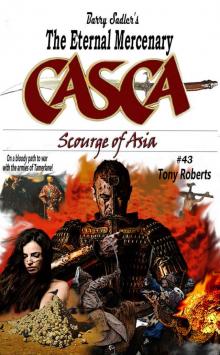 Casca 43: Scourge of Asia
Casca 43: Scourge of Asia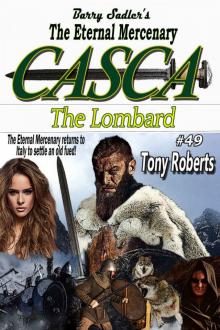 The Lombard
The Lombard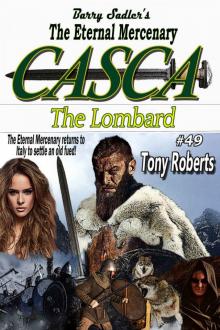 Casca 49: The Lombard
Casca 49: The Lombard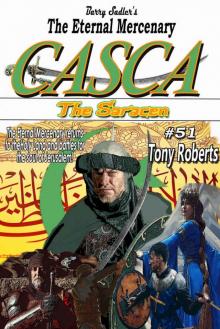 The Saracen
The Saracen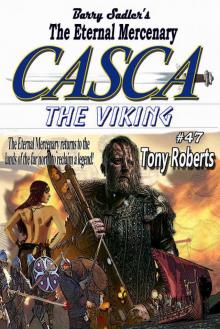 Casca 47: The Viking
Casca 47: The Viking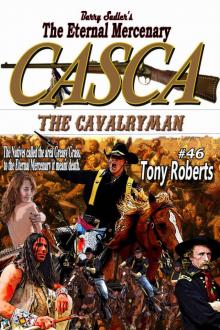 Casca 46: The Cavalryman
Casca 46: The Cavalryman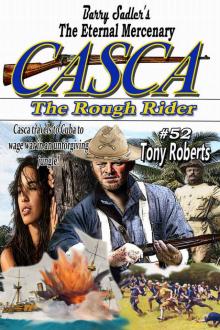 Casca 52- the Rough Rider
Casca 52- the Rough Rider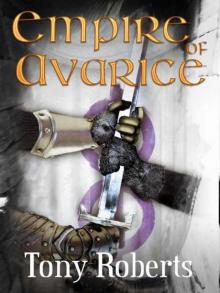 Empire of Avarice
Empire of Avarice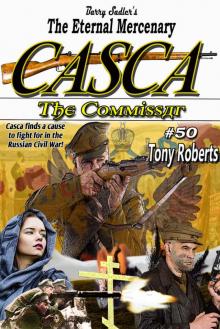 The Commissar
The Commissar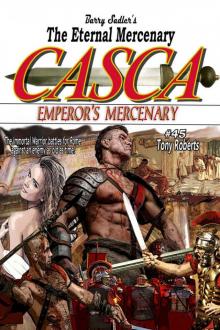 Casca 45: Emperor's Mercenary
Casca 45: Emperor's Mercenary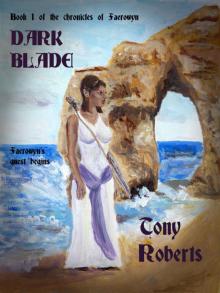 Dark Blade
Dark Blade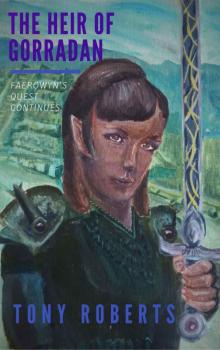 The Heir of Gorradan (Chronicles of Faerowyn Book 2)
The Heir of Gorradan (Chronicles of Faerowyn Book 2)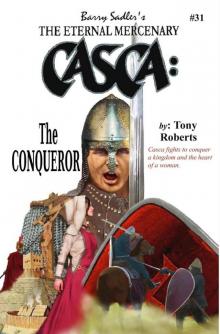 Casca 31: The Conqueror
Casca 31: The Conqueror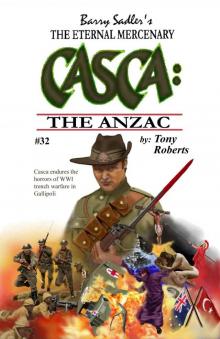 Casca 32: The Anzac
Casca 32: The Anzac The Anzac
The Anzac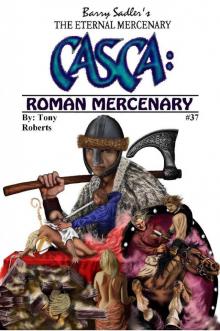 Casca 37: Roman Mercenary
Casca 37: Roman Mercenary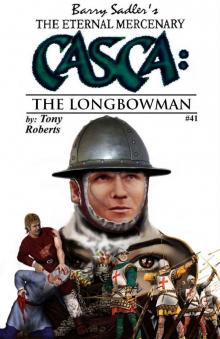 Casca 41: The Longbowman
Casca 41: The Longbowman The Longbowman
The Longbowman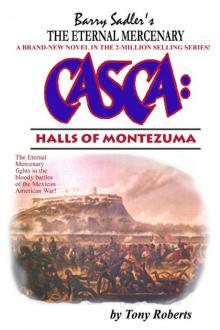 Casca 25: Halls of Montezuma
Casca 25: Halls of Montezuma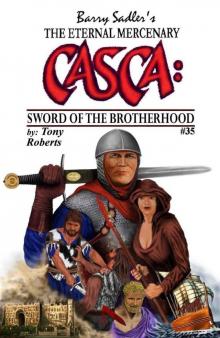 Sword of the Brotherhood
Sword of the Brotherhood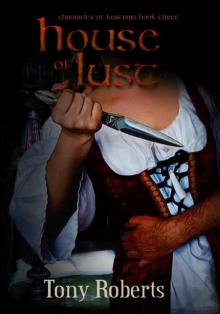 House of Lust
House of Lust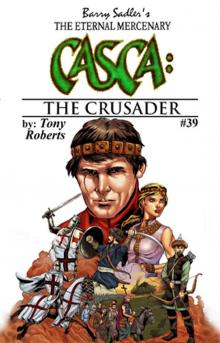 Casca 39 The Crusader
Casca 39 The Crusader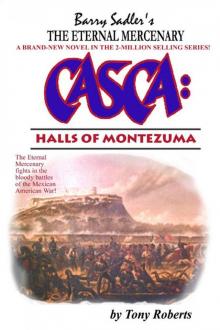 Halls of Montezuma
Halls of Montezuma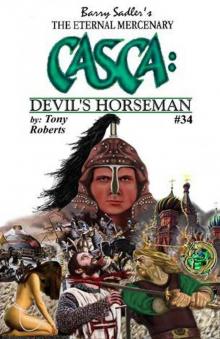 Devil's Horseman
Devil's Horseman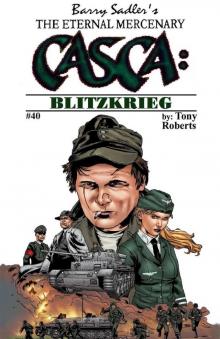 Casca 40: Blitzkrieg
Casca 40: Blitzkrieg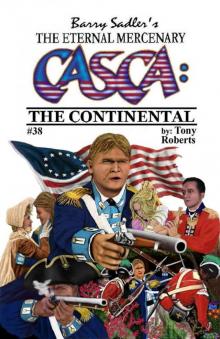 Casca 38: The Continental
Casca 38: The Continental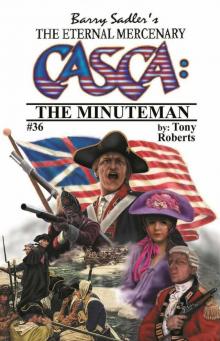 The Minuteman
The Minuteman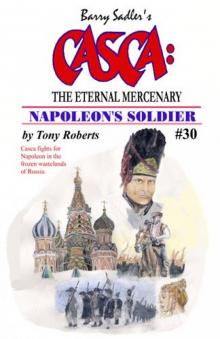 Napoleon's Soldier
Napoleon's Soldier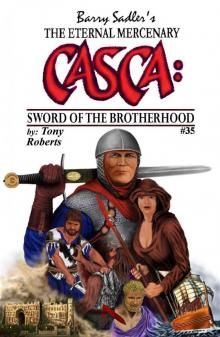 Casca 35: Sword of the Brotherhood
Casca 35: Sword of the Brotherhood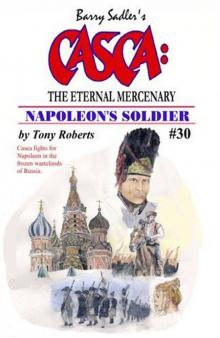 Casca 30: Napoleon's Soldier
Casca 30: Napoleon's Soldier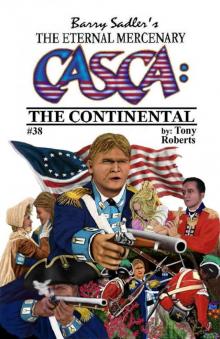 The Continental
The Continental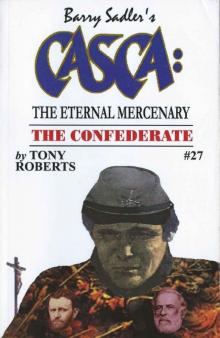 The Confederate
The Confederate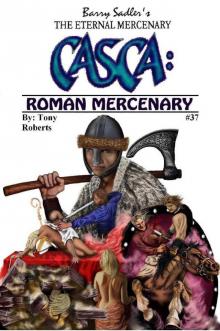 Roman Mercenary
Roman Mercenary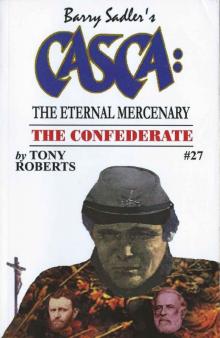 Casca 27: The Confederate
Casca 27: The Confederate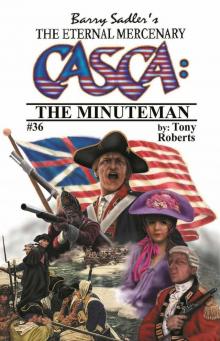 Casca 36: The Minuteman
Casca 36: The Minuteman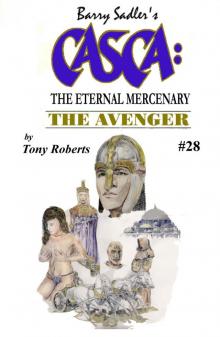 Casca 28: The Avenger
Casca 28: The Avenger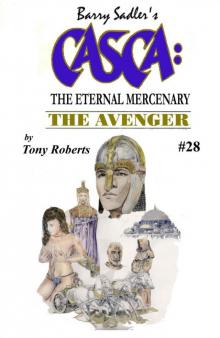 The Avenger
The Avenger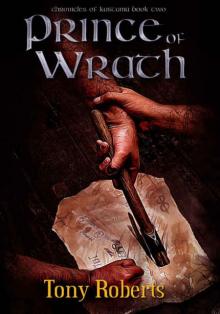 Prince of Wrath
Prince of Wrath